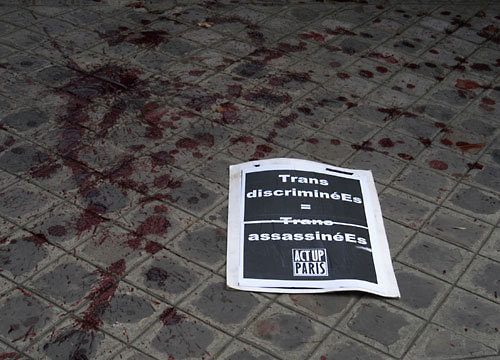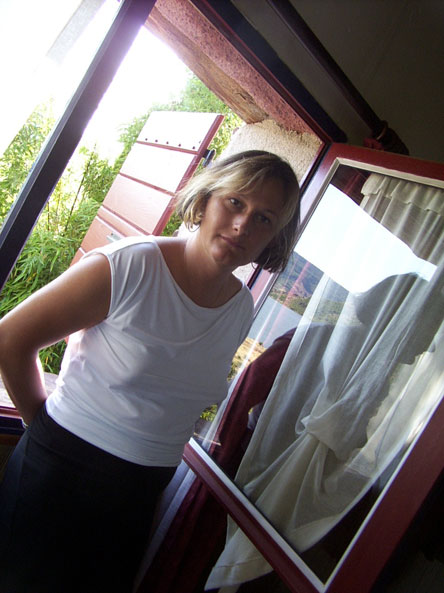
Karine's Story
Copyright © 2004-5, Karine Espineira

Karine Espineira (France, originally Chile)
Chargée de Communication
http://patatrans.free.fr/accueilbis.html
http://patatrans.free.fr/karine.html
http://sans.contrefacon.free.fr/
Links to French Trans-support associations
Veille TranssexuellE Internet (VITE)
Groupe Activiste Trans (G.A.T.)
LInks to Karine's report on media portrayals of trans people
La transidentité et les médias: Un cadre et un contexte propices à la discrimination (Fr)
Transidentity and médias: A framework and a context favourable to discrimination (En)
Transidentidad y medias: Un ambito y un contexto propicios para discriminación
(Es)
Link to information about Karine's new book:
"La transidentité, de l'espace médiatique à l'espace public"
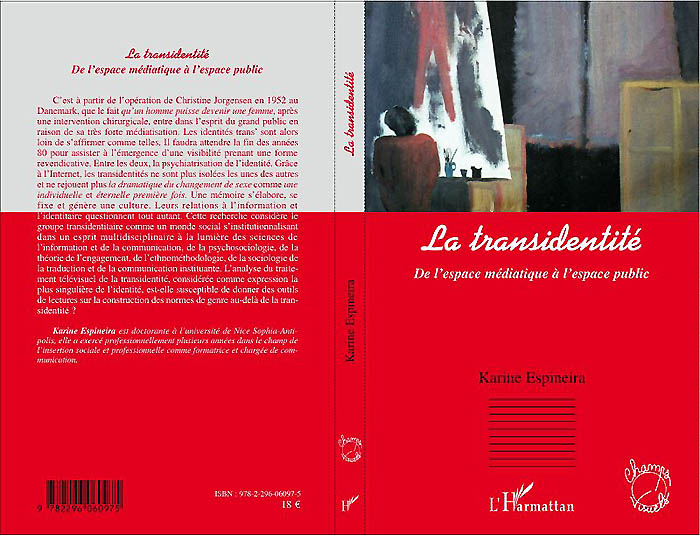
Karine's Story
Karine Espineira was born in 1967 in Santiago, Chile, to a Chilean father and a French mother. The family immigrated to France after the Chilean putsch of September 11, 1973. She already knew since she was six years old that she was meant to be a girl.
In 1987, Karine was the victim of a serious road accident and doctors estimated that she would die. However, she survived, which was a “miracle” according to the doctors. More than thirty surgical operations were necessary, over several years. In 1988, she entered the University of Grenoble in “Letters and Communication”. She worked in particular in 1992 on the settings of the political speech in television through a multidisciplinary analysis of the media and processes of reception and interpretation. She met many journalists and politicians during her field works.
In 1993, she began work on her Doctorate at the Autonomous University of Barcelona in Spain. However, she gave up at the end of the year and started to work in that country. In 1994, she returned in France. The weight of her gender identity now became too heavy for her to bear. She could not manage any more to hide her femininity in secrecy, and to play at being a man she would be never become. This began the end to her dual-life in 1995, when she was 27 years old.
One year later, she went up to Paris and joined the ranks of the ASB (Association of the Syndrome of Benjamin) where she met Maud Thomas, who would become her partner in life and “militancy”.
She engaged immediately in the French transition protocol, which starts with psychiatric interviews. She broke off from this protocol at the end of three months, because she was revolted by the reality of this protocol, and by the surgical "failures" of the French teams. She was also revolted by their theories, which legitimated an excessive pathologization of transsexualism. Thus she began on a parallel course, seeing other personnel and beginning her hormonization, while still seeing a psychiatrist on the official team. In October 1998, she underwent the SRS operation in Belgium, and obtained her official change of registry (birth certificate change) some months later.
The Parisian period was marked also by joining the group the ZOO of Marie-Helene Bourcier. This is an association which gathers all the identities and bases itself on an ideal model of the social constructivism (Judith Butler), Queer theory, “anti-essentialist, anti-assimilationniste, anti-psychiatric”. She took part in the seminar Q of the ZOO, published in the work "Q like Queer" (Cahiers Gai Kitsch Camp, 1998). During this time, Maud and Karine were introduced for the first time to the conceptual and political concepts of Lesbotrans in France. They also took part in the 3Keller, the magazine of the Gay and Lesbian Center of Paris.
In 2001, Karine settled in Marseille with Maud. She became the person in charge of Public Relations and Communication for a social organization which intervenes on several levels: social, artistic and multi-media. She also works with local institutions and takes part in a European program Equal ("Fights against racial discriminations in the access to employment"), and carries out support of communication within the various frameworks of its occupation.
Impassioned in informatics, she is working on a historical novel which covers the period (1892-1855), and on two tests on the media treatment of the politico-sexual minorities, and on over 20 years of Transsexualism in television.
Having completely assimilated into society, she is now making a comeback as a militant in France. Two Internet sites reflect this state of mind: Veille Internet Transsexual (“Transsexual Internet Take Care”) (see VITE information below), a clearly militant site that is a response to the discriminatory and eccentric theories of establishment psychologists, psychiatrists and academics, and a place that is also a relay of the actions of the GAT (Group Activist Transsexual, with Vincent Hesay, Carine Boeuf, Tom Reucher, Maxime Zitouni, Pascale Ourbih, Marlène Rikwe, Maud Thomas, Karine Espineira...). (See GAT information below).
She is maintaining these activities so as to be visible as a transsexual, from a political and militant point of view, in France and elsewhere.
Since 2006, she has returned to the university and is
pursuing a doctorate in Information and Communication Sciences in the
laboratory I3M of the university of
Nice-Sophia Antipolis. In September, 2008 she published, "La
transidentité, de l'espace médiatique à l'espace public" in the editions
l’Harmattan. This study places the subject of transidentité at the center of the
Social and human Sciences and asks questions of representations.

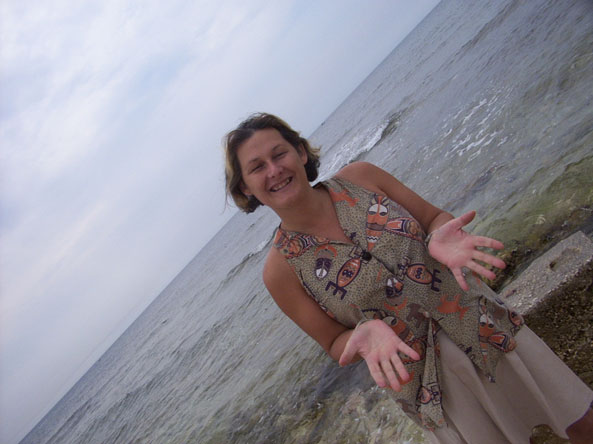
L'histoire de Karine
Karine Espineira est née en 1967 à Santiago du Chili de père chilien et de mère française. La famille émigra en France après le coup d’état du 11 septembre 1973. Elle savait déjà depuis l’âge de six ans qu’elle était une fille.
En 1987, elle est victime d’un grave accident de la route et on l’estime perdue. Dite miraculée selon les médecins, elle survie et subira près d’une trentaine d’opérations chirurgicales sur plusieurs années. En 1988, elle entre à l’université de Grenoble en Lettres et Communication. Elle travaillera notamment en 1992, sur la mise en scène du discours politique à la télévision à travers une analyse multidisciplinaire de la télévision et des processus de réception et d’interprétation. Elle rencontre journalistes et homme politiques au cours de son travail sur le terrain.
En 1993, elle commence son Doctorat à l’Université Autonome de Barcelone. Elle abandonnera en fin d’année et commencera à travailler dans le pays. En 1994, retour en France. Le poids de l’identité est trop lourd. Elle ne parvient plus à vivre sa féminité dans le secret, à jouer à être un homme qu’elle ne sera jamais. Ce qui mettra fin à sa vie de couple en 1995, elle a 27 ans.
Un an plus tard, elle monte à Paris et rejoint les rangs de l’ASB (Association du Syndrome de Benjamin) où elle fera la connaissance de Maud Thomas qui deviendra sa compagne de vie et de militance.
Elle s’engage immédiatement dans le protocole français qui commence avec un suivi psychiatrique. Elle rompt au bout de trois mois car elle est révoltée par la façon, dont celui se déroule, par les « ratés » chirurgicaux des équipes françaises. Ainsi que par les théories qui légitiment une pathologisation à outrance. C’est ainsi qu’elle commence un parcours parallèle et personnel en se trouvant un psychiatre hors équipe officielle et en débutant son hormonation. En octobre 1998, l’opération a lieu en Belgique, et elle obtient son changement d’état-civil quelque mois plus tard.
La période parisienne est marquée aussi par l’adhésion au groupe le ZOO de Marie-Hélène Bourcier. Une association qui regroupe toutes les identités et se basant sur un modèle théorique du constructivisme social (Judith Butler), théorie Queer, anti-essentialiste, anti-assimilationniste, antipsychiatrique. Elle participera au séminaire Q du ZOO, publiés dans l’ouvrage « Q comme Queer » (Cahiers Gai Kitsch Camp, 1998). Dans leur partie, Maud et Karine introduisent pour la première fois la notion conceptuelle et politique de Lesbotrans en France. Elles participent également au 3Keller, le journal du Centre Gay et Lesbien de Paris.
En 2001, elle s’installe à Marseille avec Maud. Elle devient la Chargée de Communication d’une structure qui intervient à plusieurs niveaux : social, artistique et multimédia. Elle travaille avec les institutions locales et participe à un programme Européen Equal « Lutte contre les discriminations raciales dans l’accès à l’emploi », et réalise des supports de communication dans les différents cadres de son activité professionnelle.
Passionnée d’informatique, elle travaille toujours sur roman historique qui couvre la période (1892-1855), ainsi que sur deux essais sur le traitement médiatique des minorités politico-sexuelle, et sur 20 ans de Transsexualisme à la télévision.
Totalement fondue dans la société, elle fait un come-back militant car en France, les choses ne bougent que trop lentement. Deux sites internet reflètent cet état d’esprit : Veille Internet Transsexuel, clairement militant qui se veut être une réponse aux théories discriminatoires et farfelues, une place qui se veut aussi un relais de l’actions du GAT (Groupe Activiste Trans, with Vincent Hesay, Carine Boeuf, Tom Reucher, Maxime Zitouni, Pascale Ourbih, Marlène Rikwe, Maud Thomas, Karine Espineira...).
Elle maintenant pour projet, de créer sa propre structure, d’être visible et lisible comme transsexuelle, dans une optique politique et militante en France et ailleurs.
Depuis 2006, elle est retournée sur les bancs de l'université
et poursuit actuellement un doctorat en Sciences de l'Information et de la
Communication au laboratoire I3M de
l'université de Nice-Sophia Antipolis. Elle publie en septembre 2008, “La
transidentité, de l'espace médiatique à l'espace public” aux éditions
l'Harmattan. Cette étude replace la thème de la transidentité au centre des
Sciences Sociales et Humaines et pose la question des représentations.
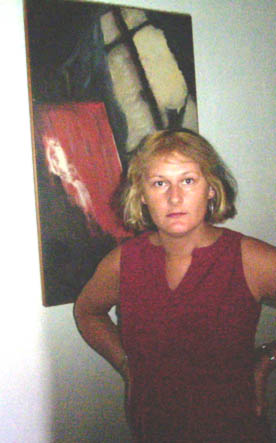
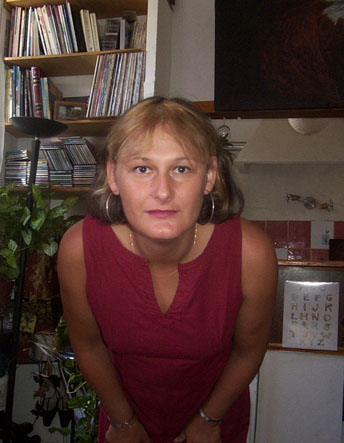
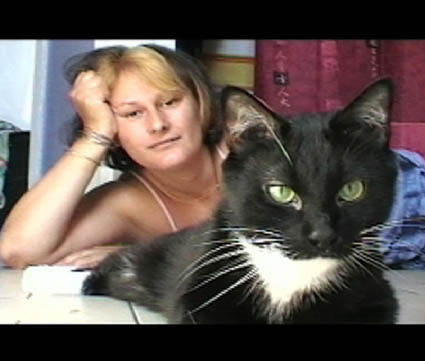
La Historia de Karine
Karine Espineira nació en 1967 en Santiago del Chile de padre
chileno y madre francesa. La familia emigró en Francia después
del golpe de Estado del 11 de
septiembre de 1973. Ella sabía ya, desde la edad de seis años, que era una
chica.
En 1987, fue víctima de un grave accidente de tráfico. Los médicos consideran
que va a morir. Sobrevive por miraculo. Sufrirá cerca de una treintena de
operaciones quirúrgicas sobre varios años. En 1988, entra a la Universidad de
Grenoble en Literatura y Comunicación. Trabajará, en particular, en 1992, sobre
la puesta en escena del discurso político a la televisión a través de un
análisis multidisciplinar de la televisión y de los procesos de recepción e
interpretación. Se entrevista con periodistas y hombre políticos durante su
trabajo in situ.
En 1993, comienza su Doctorado a la Universidad Autónoma de Barcelona.
Abandonará en final de año y comenzará a trabajar en el país. En 1994, vuelta en
Francia. El peso de la identidad es demasiado pesado. No llega ya a vivir su
feminidad en el secreto, a jugar a ser un hombre que nunca será. Lo que pondrá
fin a su vida de pareja en 1995. Tiene 27 años.
Un año más tarde, asciende en París y junta las filas del ASB (Asociación del
Síndrome de Benjamin) donde hará el conocimiento de Maud Thomas que se volverá
su compañera de vida y de militancia. Se compromete inmediatamente en el
protocolo francés que comienza con un seguimiento psiquiátrico. Rompe al cabo de
tres meses ya que es rebelada por la forma, en que el se desarrolla y por los "fracasados"
quirúrgicos de los equipos franceses. Así como por las teorías que legitiman un
pathologisation a exceso. Por ella comienza un curso paralelo y personal
haciéndose su propio protocolo y comenzando su hormonación. En octubre de 1998,
la operación tiene lugar en Bélgica, y obtiene su cambio de estado-civil algunos
meses más tarde.
El período parisiense se caracteriza también por la adhesión al grupo el ZOO de
Maria- Hélène Bourcier. Una asociación que agrupa todas las identidades y que se
basan en un modelo teórico del constructivismo social (Judith Butler), teoría
Queer, “anti-essentialiste”, “anti-assimilationniste”, “antipsychiatrique”.
Participará en el seminario Q del ZOO, publicados en la obra
"Q como Queer" (Cahiers Gai
Kitsch Camp, 1998). En su parte, Maud y Karine introducen por primera vez el
concepto conceptual y político de Lesbotrans en Francia. Participan también al
3Keller, el Diario del Centro Gay y Lesbiano de París.
En 2001, se instala en Marsella con Maud. Ocupa la función Responsable de
Comunicación de una estructura que se produce a varios niveles: social,
artístico y multimedia. Trabaja con las instituciones locales y participa en un
programa Europeo Equal "Lucha contra las discriminaciones raciales en el acceso
al empleo", y realiza varios documentos de comunicación en los distintos cuadros
de su actividad profesional. Apasionada de informática, trabaja siempre sobre
una novela histórica que abarca el período (1892-1855), así como sobre dos
estudios sobre el tratamiento televisual de las minorías sexuales y políticas, y
sobre 20 años de Transexualismo en televisión. Completamente fundida en la
sociedad, hace un come-back militante ya que en Francia, las cosas se mueven
demasiado lentamente. Dos sitios Internet reflejan este estado de ánimo:
Veille Internet Transexual, claramente
militante que se quiere ser una respuesta a las teorías discriminatorias y “locas”,
un lugar que quiere ser también un enlace de la acción del
GAT (Grupo Activista Transexual,
with Vincent Hesay, Carine Boeuf, Tom Reucher, Maxime Zitouni, Pascale Ourbih,
Marlène Rikwe, Maud Thomas, Karine Espineira...).
Ella tiene ahora por proyecto, de crear su propia estructura, ser visible y
legible como persona transexual, en la óptica política y militante en Francia y
en otros lugares.
Desde el 2006, regresó sobre los bancos de la universidad y
persigue actualmente un doctorado en Ciencias de la Información y de la
Comunicación al laboratorio I3M de la
universidad de Niza-Sophia Antipolis. Publica en septiembre de 2008, "El
transidentité, del espacio mediatico al espacio publico" a las ediciones
l’Harmattan. Este estudio repone tema del transidentité en el centro de las
Ciencias sociales y Humanas y plantea la cuestión de las representaciones.

Links to French Trans-support associations:
Hi, hello, hola, bonjour ! :o)
“Vous, nous, ils et elles… Je, tu, elle et il… nous sommes le Rhizome ! La
tige souterraine sur laquelle naissent les tiges aériennes, les feuilles et les
racines. Un objectif parmi beaucoup d'autres. Péréniser le commun et nos luttes.
Communiquer sur une base égalitaire. Faire de l'information une richesse, une
base documentaire, un élan salutaire…Faire pour l'autre aussi bien que pour soi
même. Partager et éprouver au delà de soi. Déjà une victoire…”
Dear Friends,
Here is the french main trans’ organizations and other structures tapestry drawn
up by the team of the Groupe Activiste Trans – GAT. The number of French
trans’ organizations and other structures has increased quite a lot these last
years and is expected to increase in the next year.
Beside these organizations and structures, there are many other individual
relevant trans’ web-sites.
The french trans’ tapestry is changing very fast, therefore it is possible that
our list of trans’ organization and structures is not up to date at the time you
will receive it.
Expecting to have satisfied you.
Kindest regards.
Karine Solène Espineira and Marlène Riwkeh Mèges
for the Groupe Activiste Trans – GAT (Paris, France)
FRENCH
TRANS’ MAIN ORGANIZATIONS AND OTHER STRUCTURES
1.Organizations :
GAT Groupe Activiste Trans’
Vincent Hesay and Carine Boeuf (and others…)
gataction@netcourrier.com
(ASB) Association du Syndrome de Benjamin
Association du Syndrome de Benjamin informs, helps and organizes meetings
(Yearly march : ExisTrans), conferences and discussions involvement in
research... For general public.
Contact : Yann Laingui, Chairman
asb@asbfrance.org
(CARITIG) Centre d'Aide, de Recherche et d'Information sur la Transsexualité
et l'Identité de Genre
Center for Assistance, Research and Information on Transsexuality and
Gender Identity.
Contact : Armand Hotimsky, Chairman
caritig@caritig.org
Le PASTT
Contact : Camille Cabral, Chairwoman & Pascale Ourbih, Vice
Chairwoman
An association which fights against AIDS and works for insertion of transgender
people whatever their social condition
-wether prostitute or not,
-wether migrant or not,
-wether addict or not.
pascale.ourbih@wanadoo.fr
Association l'Amicale du Nid
An association which fights against AIDS and works for insertion of people
whatever their condition
-whether transgender or not,
-whether prostitute or not
Contact regarding trans people : Sophie Rollan
sophie.rollan@free.fr
amicale-dunid-31insertion@wanadoo.fr
Autres Regards
An association which fights against AIDS and works for insertion of people
whatever their condition
-whether transgender or not,
-whether prostitute or not
Contact concerning trans people : Valérie Soyer
trans.13@wanadoo.fr
www.autres-regards.asso.fr
(in maintenance)
Cabiria
(As for PASTT)
contact: Diane Gobeil
Associations which advocates for the protections of Lyons sex workers rights. It
also takes care of trans’ peoples.
http://www.cabiria.asso.fr/
STS - Support Transgenre Strasbourg
Contact : Alexandra Augst-Merelle and Cornelia Schneider
Our priority is support on the ground and individual help to transgender people.
sts67@sts67.org
Trans’Act !
Contact : Nadya Xin
Recent non formal group, specialized in information, help and solidarity.
This organization wants to be group acting on concrete points of common interest
relating to our communities (conferences, ateliers, assistance, manifestations
and production of documentary).
http://i-trans.net/forum/
Trans' Aide Lorraine
Contact : Stéphanie Nicot
An association, specialized in information, help and solidarity.
trans.info.lorraine@wanadoo.fr
Tiresias (Paris)
contact: Arnaud Charpentier, Chairman
association.tiresias@laposte.net
VigiTrans
http://www.archiq.fr.vu
The “petition for integration of trans’ in the Committee
of running of the Homosexual Ressources and Archives Center of the City of Paris
(Centre de Documentation et d'Archives Homosexuelle de la ville de Paris -
CDAHP)” and other infos about the topic.
tom3000@free.fr
2.Others
trans’ structures :
The Trans’ Commission of Act Up Paris
Contact : Hélène Hazera
AIDS fight and prevention …
helene.hazera@radiofrance.com
Le Site de Tom
Contact : Tom Reucher
Scientific and Trans’ activist website of Tom Reucher (founder of l’ASB),
trans (ftm) and psychologist, on the “transidentities”, (trans questions).
Resources center for transsexuals, transgender, intersexuals, and those who are
interested by the issues which follow : hormonal treatments, surgery, social
security,medical protocols, prosthesis, marital status, civil status change. It
includes also various demonstrations, bibliographies, texts and papers,
dissertation about transsexuals sexuality..
tom3000@free.fr
http://syndromedebenjamin.free.fr/
Bistouri Oui - Oui !
http://bistouriouioui.free.fr/
The radio made by the trans and for the trans and also ... for everyone !!!
Team :
http://bistouriouioui.free.fr/l_equipe_les_photos.htm
Fabulous Gonzesses
Contact : Karine Espineira and Maud Thomas
Recent non formal group specialized in information, help and solidarity. We
want to create a libertarian movement, inspired by Queer Theory.
karine.espineira@free.fr
http://patatrans.free.fr/texteapenser.html/
http://www.fabulous-gonzesses.com/forum/
VITE (Veille Internet Transsexuel-lE)
Contact : Maud Thomas and Karine Espineira
To denounce what the psychiatrists say about us, for us, but without us !
deslynx@free.fr
List drawn up by the team of the Groupe Activiste Trans – GAT (Paris, France).
--
Le Réseau du Groupe Action Trans’
Des Trans’ en Colère !
http://transencolere.free.fr/
Bistouri oui-oui, l'émission de radio trans :
http://bistouriouioui.free.fr
Syndrome de Benjamin :
http://syndromedebenjamin.free.fr
Lazzftm :
http://ftm.8bit.co.uk
VITE :
http://natamauve.free.fr
Patatrans :
http://patatrans.free.fr/texteapenser.html
Résumé/grille de lecture pour les textes compilés
dans le site Veille TranssexuellE Internet (VITE)
La situation de la France est à tous égards exemplaire d’une vieille nation riche, colonialiste. S’il existe des associations en France, aucune ligne collective ne se dégage malgré le soutien dans certains cas du mouvement homosexuel. Les associations restent divisées devant les décisions gouvernementales quant à la résolution personnelle et sociale du transsexualisme, comme l’avait été la résolution sociétale de l’homosexualité. La France a été condamnée par la Cour Européenne, la sommant de dégager une solution juridique en ce qui concerne les papiers d’identité.
Traduction :
Summary for the texts compiled in the website Veille Internet Transsexuelle The situation of France is one an old rich colonialist nation. If there are associations in France, no collective line is released in spite of the support in certain cases from the homosexual movement. Associations remain divided in front of the government decisions as for the personal and social resolution of the transsexualism, like had been to homosexuality. The European Court, summoning it to release a legal solution with regard to the identity papers, condemned France.
Sur le suivi psychiatrique, le modèle de la pathologie mentale, issu du DSM, domine. Ce qui permet à des auteurs totalement fantaisistes de diffuser des thèses à contenu psychanalytique le plus souvent, parfois à la limite de la discrimination pure et simple. Très souvent, il ne s’agit que d’une simple transcription des veilles théories de l’inversion du sujet homosexuel, directement appliqué au sujet transsexuel.
Traduction :
Over the psychiatric follow-up, the model of mental pathology, resulting from the DSM, dominates. This situation makes it possible to author completely whimsical and diffuse theses with psychoanalytical contents, sometimes at the very limit of discrimination. Often, it is not absolutely necessary of one simple transcription of old theories of the inversion of the homosexual subject, directly applied to transsexual object.
P-H. Castel est l’un de ses auteurs, appliquant un modèle psycho-philosophique universaliste au transsexualisme. L’auteur utilise une thèse simple : le catastrophisme sociopolitique et l’applique au groupe le plus petit, le plus récent et le plus fragile (« minorité ») sur le « marché » des idées et use de toute la panoplie idéologique tout en s’appuyant sur une destruction très réelle (du lien social notamment) dans la société contemporaine. Il détourne les ouvrages de Deirdre McCloskey http://pierrehenri.castel.free.fr/Articles/McCloskey.htm] et de Kate Bornstein, faisant jouer un essentialisme traditionnel contre le constructivisme social américain de Robert Stoller et de Judith Butler, notamment. Le constructivisme social français, en tant que savoir ordonné et une voie sociale, n’existe tout simplement pas. Or, le transsexualisme est à cheval entre ces deux modèles conceptuels, empruntant à l’un et à l’autre dans un mode totalement inédit. Ce qui l’oblige à postuler une destruction métaphysique et une destitution sociale dans une transgression de l’ordre symbolique. L’un étant l’étai essentiel de l’autre et constituant une unicité intangible, croit-il. Si l’on détruit l’un, l’autre est fragilisé. Ce qui justifierait, selon cet auteur, un argumentaire et une légitimation suffisants à une philosophie métaphysique de l’être donnée par et dans un ordre social traditionnel, logique et cohérent. Modèle qui va s’institutionnaliser et se chercher une nouvelle légitimité dans la rationalité scientifique tout en s’appuyant sur les savoirs psychanalytiques.
Traduction :
PH. Castel is one of the authors, applying a psycho-philosophical model applied to transsexualism. The author uses a simple thesis: the “catastrophist sociopolitical” (in french: le catastrophisme sociopolitique) and he applies it at the smallest group, most recent and most fragile ("minority") on the "market" of the ideas and use of all the ideological panoply all while being based on a very real destruction (social bond in particular) in the contemporary society. He diverts the works of Deirdre McCloskey (http://pierrehenri.castel.free.fr/Articles/McCloskey.htm) and Kate Bornstein, making play a traditional essentialism against the American social constructivism of Robert Stoller and Judith Butler, in particular. The French social constructivism, as knowing ordered and a social way, does not exist quite simply. However, the transsexualism is between these two conceptual models, borrowing from the one and the other in a completely new mode. What obliges it to postulate a metaphysical destruction and a social dismissal in a transgression of the order symbolic system. One being the essential stay of the other and constituting an intangible unicity, he believes. If one is destroyed, the other is weakened. What would justify, according to this author, a sales leaflet and a legitimation to a metaphysical philosophy of a human being determinates in a traditional, logical and coherent order social. Model which will be institutionalized and to seek a new legitimacy in scientific rationality all while being based on the psychoanalytical knowledge.
Or cet ordre n’est autre que la société traditionnelle, patriarcale et masculine. Le transsexualisme détruit les formes de subjectivité identitaires (le mythe de la conïcidence biologie = identité) et sexuelles mises en place par ce régime biosexuel et politique. Il s’en prend logiquement à J.Butler et Gayle Rubin dans leurs attaques raisonnées de ce régime biosexuel masculine, ainsi qu’à Pierre Bourdieu et son analyse sociohistorique de la domination masculine.
Traduction :
However this order is not other than the traditional and patriarchal society. The transsexualism destroys the forms of subjectivity “identitaires and sexual installations by a mode “biosexuel” and political ” (the myth of the coincidence biology = identity). He criticizes J. Butler and Gayle Rubin in their reasoned attacks of this mode “biosexuel”, like to Pierre Bourdieu and his socio-historical analysis of the male domination.
Le transsexualisme est surtout un sujet-objet convoité pour montrer métaphoriquement et symboliquement une destruction de l’intérieur, issu autant de ces groupes émergents que d’un panel de savoirs croisés qui tendent à se dégager d’un vieux modèle historique et qui viendraient soutenir conceptuellement cette émergence contemporaine en leur offrant une assise théorique.
Traduction :
The transsexualism is especially an subject-object coveted to show métaphorically and symbolically a destruction of the interior, resulting as many these emergent groups that of a panel of cross knowledge which tends to emerge from an old historical model and which would come conceptually to support this contemporary emergence in their offering a theoretical base.
Au total, Castel ne défend qu’un modèle symbolique et idéologique de la société traditionnelle d’une part, d’un modèle traditionnel de « philosophie » à la française, mâtiné d’une psychanalyse logique d’autre part. Ce qui l’oblige à dire en s’y retranchant, la psychanalyse est l’ennemi n°1. Ennemie entre autres du féminisme moderne, des thèses ethnographiques initiées par Margaret Mead, des thèses de Stoller sur l’identité de genre contre le modèle de la bisexualité psychique de Freud. Modèle reposant sur un modèle de santé mentale, de normes et d’une conception binaire de l’être et du monde. Le modèle politico-sexuel de Monique Wittig (“une lesbienne n’est pas une femme”) étant totalement irrecevable sans autre examen qu’en postulant le dogme du biosexuel.
Traduction :
Castel defends only one model symbolic system and ideological of the traditional society on the one hand, a model traditional of "French philosophy" tinted of a logical psychoanalysis in other hand. Which obliges him to say while being cut off there, the psychoanalysis is the enemy n°1. Psychoanalysis as enemy of modern feminism, of ethnographic theses initiated by Margaret Mead, of the Stoller’s theses on the gender identity against the model of the psychic bisexuality of Freud. Castel’s model was funded on a model of mental health, standards and of a bipolar conception to human being and world. He attacks too the politic and sexual model of Monique Wittig (“a lesbian is not a woman”) being completely inadmissible for him without another examination only by postulating the dogma of the “biology = identity”.
Notre action se limite aujourd’hui à un harcèlement conceptuel sous forme d’analyses utilisant leur langage en profitant du réseau internet (VITE : Veille TranssexuellE Internet). Ce texte a essentiellement vocation de réponse publique à ces publications afin de donner une contre-lecture.
L’action du GAT tend à provoquer des actions directes sur le modèle d’Act-up en France auquel il est affilié, avec une forte résonance médiatique, en dénonçant une situation de monopole illégitime dans les mains d’une poignée de gens s’affirmant comme des experts de la question transsexuelle. Nous contestons la légitimité de ce modèle essentialiste pathologisant nos existences au nom d’une différence dont l’axe n’est autre qu’une conception tantôt des mœurs et valeurs, tantôt d’une conception du bien/mal ou d’une vision médicale binaire sain/pathologie. Cette différence repose sur une vision binaire et porte directement atteinte à notre existence en tant que sujets sociaux et subjectifs, faisant de nous des esclaves d’une conception sociohistorique et métaphysique.
Traduction :
Our action is limited today to a conceptual harassing in the form of analyses using their language while benefiting from Internet network. This text has primarily vocation of public response to these publications in order to give an against-reading.
The action of the GAT tends to cause direct actions on the model of Act-up in France to which it is affiliated, with a strong media resonance, by denouncing a situation of illegitimate monopoly in the hands of a handle of people affirming itself like experts of the transsexual question. We dispute the legitimacy of this model essentialist, who pathologies our existences in the name of a difference whose axis is not other than a conception sometimes of manners and values, sometimes of a design of the good vs evil, or a medical binary vision of health vs pathology. This difference rests on a bipolar vision and carries directly reached to our existence as social and subjective subjects, making us slaves of a socio historical and metaphysical conception.
G.A.T.
Grupo Acción Transexual
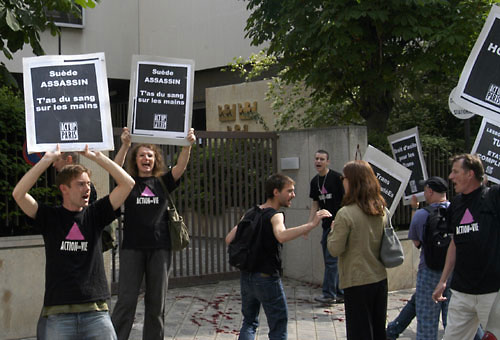
Le GAT, groupe activiste trans, dénonce l’attitude du ministère de la justice, qui vient d’afficher sa transphobie et sa solidarité avec la politique psycho-carcérale d’un autre âge réservée en France aux personnes trans (transsexuelLEs et transgenres).
Traduction:
The GAT, groups trans activist, denounces the attitude of the Justice ministry, which has just posted its transphobie and its solidarity with the politic “psycho-jail” of another age reserved in France at the trans people (transsexuals and transgenders).
En effet, ce ministre vient d’annoncer à des représentants associatifs LGBT qu’il n’inclura pas la notion d’identité de genre dans le dispositif de loi qui sera bientôt proposé au parlement pour les propos homophobes. D’ailleurs, les propos sexistes passent également à la trappe des discriminations telles qu’elles sont envisagées dans Hétéro-land.
Traduction:
Indeed, this minister has just announced to LGTB (Lesbian Gay Transsexuals Bi) associative representatives who he will not include the concept of gender identity of in the device of law, which will be proposed soon at the Parliament for the remarks homophobes. However, the sexists remarks also pass to “the trap door” of discriminations such as they are considered in “Hétéro-Land”.
Pour le GAT, ce n’est qu’une demi surprise, car lors de la remise du rapport Stasi, les trans avaient déjà été volontairement mis à l’écart.
Ne pas avoir de textes protégeant les trans encourage toutes les discriminations transphobes et entraîne l'impunité des responsables. Nous rappelons que certains actes dont sont victimes les trans, (et aussi les femmes, les lesbiennes et les gays), seraient qualifiés d'actes de tortures s'ils étaient fait par des représentants de l'Etat.
« Certes, ces actes sont commis par des personnes privées, mais la responsabilité des autorités n'en est pas moins engagée : elles peuvent en effet, aux termes des engagements internationaux en matière de droits humains, avoir à répondre de ces violations si celles-ci persistent en étant facilitées par leur complicité, leur consentement ou leur manquement à l'obligation de diligence. » (Amnesty International, (2001), Identité sexuelle et persécutions, Les éditions francophones d'Amnesty International, p. 13.)
Traduction:
For the GAT, it is only one half surprised, because at the time of the submission of Stasi (a politic man) report, the trans ones already had been voluntarily forgotten.
Not to have texts protecting the trans ones encourages all transphobes discriminations and involves impunity of the persons in charge. We point out that certain acts whose the trans ones are victims, (and also women, lesbians and gays), would be qualified of torture’s acts if they were made by Sate representatives.
"Certainly, these acts are made by private people, but the responsibility for the authorities is not less committed: they can, under international engagements as regards human rights, to have to answer of these violations if those persist while being facilitated by their complicity, their assent or their failure with obligation of diligence "(Amnesty International, (2001), sexual Identities and persecutions, the French-speaking editions d'Amnesty International, p. 13.)
Que signifie cette transphobie institutionnelle, gouvernementale, politique et médicale ?
Une chose fondamentale : pour les pseudos spécialistes des questions trans, pour les administrations qui gèrent la sécurité sociale, il ne saurait être question de traiter
différemment des personnes qui relèvent de la CLASSIFICATION PSYCHIATRIQUE ; elles ne peuvent donc pas être considérées comme des citoyenNEs et bénéficier des mêmes dispositions que les personnes dites “normales”. Grâce à l'exclusion des trans du bénéfice des textes qui seront soumis au parlement, les « médecins de la maltraitance théorique » peuvent tranquillement continuer à « torturer » les trans par des psychothérapies sous contrainte, une forme de soumission à un esclavage moderne, doublée d’une maltraitance chirurgicale aux conséquences parfois lourdes en termes de handicaps.
Traduction:
What means this institutional transphobia, governmental, political and medical?
A fundamental thing: for the pseudos specialists in the trans questions, for the administrations which manage the social security, the question it is quite out of to differently treat people who belong to PSYCHIATRIC CLASSIFICATION; they cannot thus be regarded as citizens and to profit from the same provisions as the people known as "normal". Thanks to exclusion of trans of the benefit of the texts which will be submitted to the Parliament, the "doctors of the theoretical maltraitance" (to maltreat) can quietly continue "to torture" the trans ones by psychotherapies under constraint, a form of tender to a modern slavery, doubled of a surgical maltraitance to the sometimes heavy consequences in terms of handicaps.
Qu’on ne se trompe pas : tant que les associations LGBT et en particulier les associations trans ne feront pas de la DEPSYCHIATRISATION des trans un préalable non négociable, il ne sera pas envisageable de gagner la lutte contre la transphobie ni de faire des trans des citoyens à part entière. Pour le gouvernement, pour les « psychiatres des protocoles », on ne discrimine pas des malades mentaux, on les soigne sans avoir de comptes à rendre à personne !
Traduction:
That one is not mistaken: as long as associations LGBT and in particular associations trans will not make a DEPSYCHIATRISATION of trans none negotiable precondition, it will not be possible to gain the fight against the transphobia nor to make trans full citizens. For the government, for the "psychiatrists of the protocols", one does not discriminate mental patients, one looks after them without having accounts to return to anybody!
Cette exclusion des trans des textes qui vont être soumis aux parlementaires va avoir de lourdes conséquences sur la vie quotidienne des trans. Il est en effet à prévoir que certainEs, confortés dans leurs opinions transphobes par cette exclusion explicite des trans du bénéfice des futures dispositions législatives au motif non avoué qu'ils sont considérés comme des malades mentaux, se croient autorisés à les exclure de la vie sociale et économique.
Traduction:
This exclusion of trans of the texts, which will be submitted to the members of Parliament, will have heavy consequences on the everyday life of trans. It is indeed to provide that some, consolidated in their opinions transphobes by this explicit exclusion of trans of the benefit of the future legislative provisions to the reason not acknowledged which are regarded as mental patients, are believed authorized to exclude them from the social and economic life
Le GAT rappelle ses revendications fondamentales :
The GAT points out its fundamental claims:
1- La déclassification du transsexualisme de la nosographie psychiatrique au même titre que l’homosexualité a été retirée par décision politique ; la transsexualité, compte tenu de la méconnaissance du corps médical après des dizaines d’années de “recherches”, doit être sortie du diagnostic psychiatrique préalable. La dépsychiatrisation implique une aide à l’AUTODIAGNOSTIC, conformément à la résolution du parlement européen du 12 septembre 1989.
1- The declassification of the transsexualism of the psychiatric nosography as well as homosexuality was withdrawn by political decision; the transsexuality, taking into account the ignorance of the medical profession after tens of years of "research", must have left the preliminary psychiatric diagnosis. The depsychiatrisation implies a help with the SELF-DIAGNOSIS, in accordance with the resolution of the European Parliament of September 12, 1989.
2- L’abrogation ou la révision du protocole pour que les équipes médicales se réfèrent à un protocole adapté à chaque individu et non plus sur l’entité transsexuelle.
2- The abrogation or the revision of the protocol so that the medical teams refer to a protocol adapted to each individual and either on the entity transsexual.
3- Le libre choix du médecin (et le respect de l’omnivalence des diplômes) par un
principe affirmé de l’aide à l’AUTODIAGNOSTIC. Et non plus la toute puissance médicale d’une équipe officielle auto-proclamée spécialiste qui se ferait gardienne de notre identité/corps.
3- Free choices of the doctor (and the respect of the omnivalence of the diplomas) by a marked principle of the assistance to the SELF-DIAGNOSIS. And either any medical power of an auto proclaimed official team, specialist who would be made guardian of our identities/corps.
4- Une adaptation des dispositifs juridiques et administratifs dans la période transitoire ne nous condamnant ainsi plus à la clandestinité. Le changement d'état civil avec ou sans opération.
4- An adaptation of the legal and administrative devices during the transitional period, without condemning us to more clandestinity. The civil change d'état with or without operation.
5- Une prise en charge par la sécurité sociale du parcours hormono-chirurgical qui soit uniforme sur tout le territoire et assurerait une égalité entre trans de tous niveaux socio-économiques.
5- An insurance to be covers by the social security for the hormono-surgical course which need to be uniform on all the territory and would ensure an equality between trans of all socio-economic levels
Paris, le 5 mai 2004
contact : gataction@netcourrier.com
